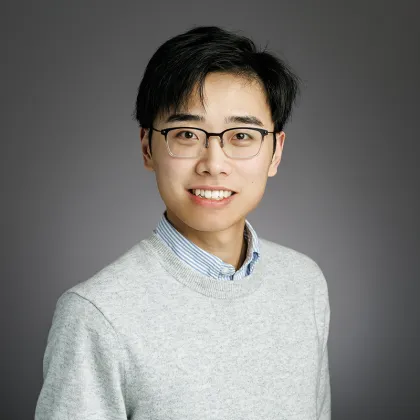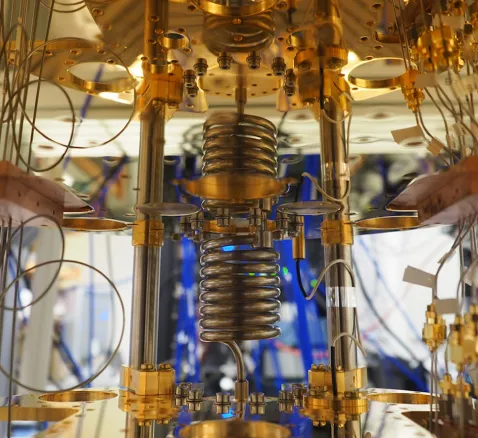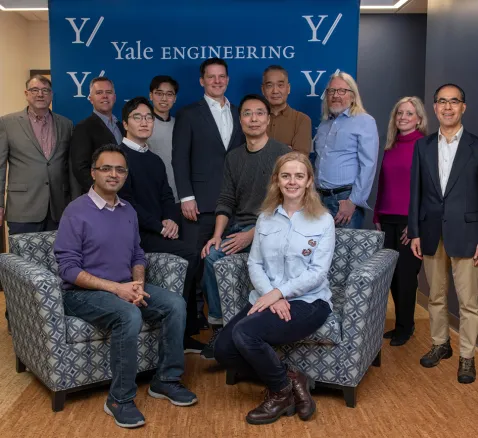Yale to launch Certificate in Quantum Science and Engineering in fall 2025
Quantum technologies are poised to revolutionize fields such as computing, cryptography, materials science, and precision sensing. As the quantum industry grows, there is a pressing national and global shortage of talent with the interdisciplinary expertise needed to drive innovation. Addressing this critical need, Yale College will introduce a new Certificate in Quantum Science and Engineering in Fall 2025.
Read more • Approximately 4 minutesThe certificate program will offer undergraduates a structured pathway into this rapidly advancing field. Managed by the Yale Quantum Institute, the program is designed to attract students from across Yale Engineering and Faculty of Arts and Sciences departments, including Applied Physics, Computer Science, Electrical & Computer Engineering, Statistics & Data Science, Physics, and Chemistry.

"Each year, about 100 students enroll in our introductory quantum information courses, and this number continues to grow," says Yongshan Ding, assistant professor of computer science and director of the certificate program. "Now our undergraduates have a structured curricular path and a community of peers to fully immerse themselves in this exciting field and develop the interdisciplinary expertise necessary to lead in the next generation of quantum discoveries and technologies."
The certificate requires five course credits—one core course in quantum information and communication, plus four electives from approved courses across various departments. Students can begin taking core courses as early as their sophomore year.
"We have prepared tracks for different majors to complete the certificate," Ding said. "For example, we have asked Chemistry Department faculty to draft an example of courses chemistry majors will be interested in taking. We've done the same for mathematics, computer science, and physics."
Ding emphasizes that the certificate is designed to be accessible to students regardless of their background in quantum physics.

“...the very mission of the certificate is to attract individuals from different backgrounds, skills, and perspectives to contribute to the future of quantum systems. Just as in classical computing, where specialists develop hardware, software, theory, and applications, the quantum field will require a broad range of trained talent."
Yongshan Ding
Assistant Professor of Computer Science
"No prior knowledge of quantum mechanics is required to take the certificate's core courses," Ding said. "In fact, the very mission of the certificate is to attract individuals from different backgrounds, skills, and perspectives to contribute to the future of quantum systems. Just as in classical computing, where specialists develop hardware, software, theory, and applications, the quantum field will require a broad range of trained talent."
Student interest has already been significant, with a recent survey showing an overwhelming number of respondents interested in pursuing the certificate. Interest has also been reflected in introductory quantum courses, with enrollment numbers surging in recent years.
Mason Abrell '26, a physics and global affairs major and co-president of the Yale Undergraduate Quantum Computing Group, sees the certificate as an important bridge between technical and non-technical fields.
"The certificate offers technical individuals the opportunity to specialize, while letting non-technical individuals get a rigorous introduction to the field," he said. "For example, for physics majors, this certificate allows them to invest more time in honing their quantum theory and experimental skills, as well as prove their specialty to interested employers. On the other hand, many business, law, and even art-focused majors can use this certificate to become 'quantum-literate,' able to integrate this cutting-edge technology into their various passions."
Abrell also highlights the importance of the certificate's interdisciplinary approach.
"I think the interdisciplinary nature serves as a great way to bring together the disparate parts of campus, from the labs of Becton to the School of Management, to collaborate on quantum computing as it moves from an obscure technology to an internationally recognized area of cutting-edge progress," he said. "That transition is hard for any technology, but especially for quantum due to its enigmatic nature, so it is critical that scientists know how to speak about their work, and that members of industry and business know how to leverage and access quantum technologies."
The career opportunities for graduates with quantum expertise are expanding rapidly across multiple sectors. "The quantum tech industry has really been taking off over the last decade, growing out of physics laboratories," noted Ding. "Major tech companies, plus hundreds of startups, have created quantum tech-centric jobs at all levels." These opportunities extend beyond traditional physics roles into areas such as pharmaceutical research, financial services, and logistics, where quantum approaches are beginning to transform problem-solving capabilities.
This creation of the certificate program aligns with the recommendations of the University Science Strategy Committee, which identified quantum science as a top priority investment for the next decade. It's also part of Yale's broader efforts in quantum education, including participation in Quantum-CT (public-private partnerships to drive use-inspired quantum technologies), the National Quantum Virtual Laboratory funded by the National Science Foundation, and various YQI programs throughout the year.
More Details
Published Date
Apr 21, 2025


